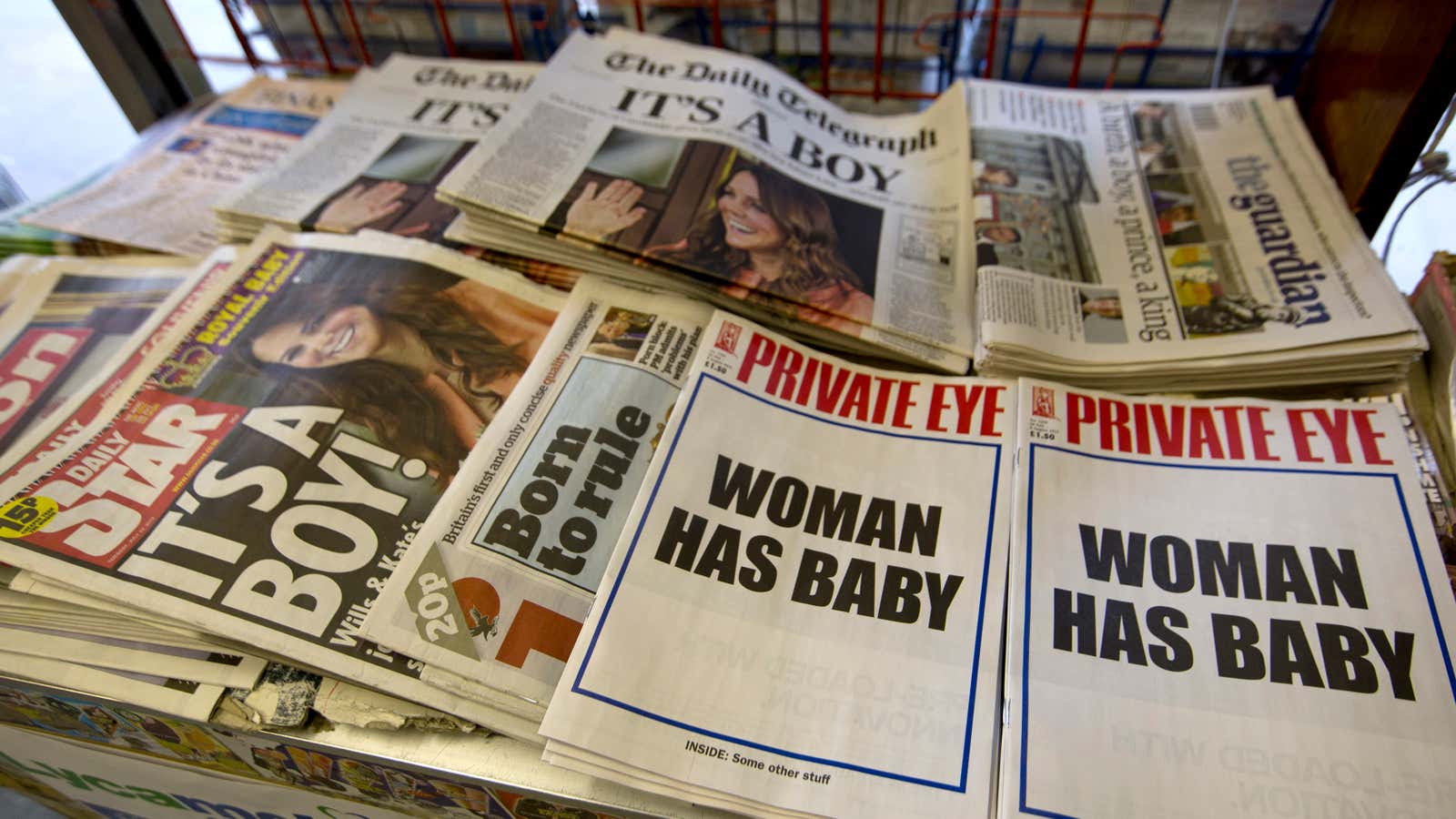The internet may be 35 years old, but its true impact on journalism has only been felt in the last decade. We’ve seen fake news and disinformation campaigns became commonplace, just as the number of frontline journalists has steeply declined. In that same period, the duopoly of Google and Facebook has snatched away advertising revenue from news publishers, while their algorithms have replaced skilled editors to become controllers of information.
Studies clearly show that the decline of the free press hurts democracy. In 2018, the UK government launched an independent review to find what, if anything, could be done to sustain high-quality journalism. After a year of evidence-gathering, the review, led by veteran British journalist Frances Cairncross, has published its findings today in a 157-page report and offered some sweeping recommendations, from installing a regulator to rein in the power of tech platforms like Google and Facebook to supporting innovation in journalism through direct grants.
I contributed to the review as a part of an 11-person advisory panel, but the views expressed in the review are those of Cairncross. Here is a summary of the full set of recommendations:
- Online platforms should create new codes of conduct to rebalance the relationships with news publishers and potentially avoid situations where a sudden tweak in the Facebook algorithm, for instance, leads to a drastic drop in traffic to news sites and cause a loss of advertising revenue.
- The UK’s competition regulator should launch an investigation into the online-advertising industry. Evidence shows the data-gathering powers of tech companies like Google have made it difficult for small players to enter the market.
- User experience for news consumers should be put under regulatory oversight, with the goal of getting the platforms to publish transparency reports and find ways of increasing users’ consumption of high-quality news.
- The UK communications regulator should work with news publishers and online platforms to draft a new strategy to improve media literacy among adults.
- The UK communications regulator should look into whether the BBC’s work is having a negative impact on commercial publishers, especially local ones, and what the BBC could do to support local news producers. (The BBC, which is funded by license fees paid for by TV users, is the biggest market intervention in British journalism—and though the BBC is delivering on the goals of providing relatively unbiased, high-quality news, its foray into celebrity and lifestyle news may be going beyond its remit.)
- The UK government should launch a new fund focused on innovations, with a recommended annual budget of at least £10 million ($13 million), aimed at improving the supply of public-interest news.
- The zero-rating of the value-added tax (VAT) should be extended to digital newspapers and magazines. Currently, consumers of physical newspapers are not charged VAT, but the tax is levied if the same publication is purchased online.
- New mechanisms for philanthropic giving, which is becoming an increasing part of sustaining high-quality journalism in countries like the US, should be created for the UK media industry. (Current UK law does not grant charitable status to nonprofit news, which limits the kind of money that organizations like the Bureau of Investigation Journalism can accept.)
- A BBC program that pays for journalists working at local publications to cover local governments should be expanded to include as many as 300 local journalists, at an additional cost of £8 million each year. The BBC launched the local-democracy reporter program in 2017, with the goal of ensuring that commercial realities don’t affect crucial information flow in a democracy.
- An Institute for Public-Interest News should be created to serve as an administrative hub for tech platforms, news publishers, the BBC, and government regulators. It would take over responsibility for the local-democracy reporting program and for the distribution of money in the recommended innovation fund. The institute could eventually resemble something like the Arts Council, which as the name suggests promotes all forms of art, and commands an annual budget of more than £600 million ($800 million).
The recommendations, if adopted in full, should help improve the outlook for high-quality journalism. “However, the fact remains that we are likely to see a further decline in the size of the UK’s news publishing sector—in journalists and in titles,” the review concludes. “The stories people want to read may not always be the ones that they ought to read in order to ensure that a democracy can hold its public servants properly to account.”
The UK government has said it will respond to the Cairncross review later this year. As an immediate step, Jeremy Wright, the cabinet minister for media, has said he will write to all of the relevant regulatory authorities to take the recommendations of the review under consideration.
Often times, expert-led reviews are notable for making a splash upon their release and are then quietly forgotten. That’s unlikely to happen with this review, reckons Cairncross. “A review of the future of the press will remain in the public eye, because it is in the interest of the press,” she said. “It’s a review about an industry with enormous power, even now, to shape public opinion.”
